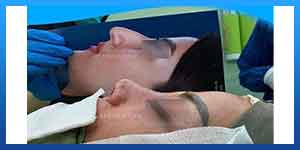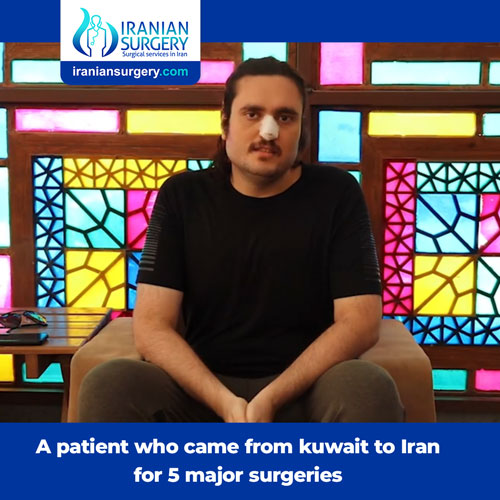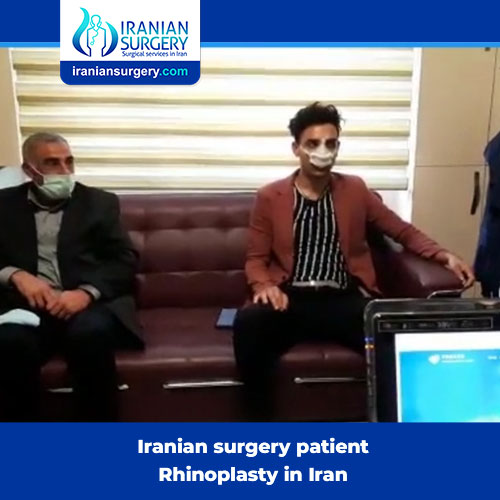Rhinoplasty Eye Swelling
Eyes Swollen Shut After Rhinoplasty
why do your eyes get swollen after nose surgery?
how to reduce eye swelling?
why do eyes swell after nose job?
why do eyes get swollen after nose job?
why do eyes swell after nose job?
For some rhinoplasty patients the most agonizing part of the rhinoplasty surgery is the post-op. The difficulty presents itself in the form of the bruising and swelling. The surgery which is meant to bring greater visual appeal to the face often makes it look worse before it can get better. The good news is there is a beautiful nose waiting at the end of the recovery period.

Bruising can appear under the eyes, making the patient appear to have gotten into an unfortunate fist fight. This is perfectly normal and typically subsides in one to two weeks. Everyone is different, so it is impossible to say with certainty exactly how many days a person will see bruising. After 24 to 48 hours, patients may already begin to see some slight improvement.
Swelling is also unavoidable. Swelling of the eyelids is always most pronounced on the second morning following any facial plastic surgery. The nose has undergone a big adjustment and puffiness should be expected. If the nasal bone requires fracturing during surgery there may be additional swelling. The majority of it, like the bruising, will lessen over the 2 week time frame. It should be noted though that some minor swelling can still be present 12-18 months after rhinoplasty surgery, but this is generally not noticeable. The initial weeks are the most noticeable though and the time in which action can be taken to reduce the degree of nasal swelling.
Read more about : Rhinoplasty surgery before and after
Read more about : Rhinoplasty podcast with Dr Afshan shah
Read more about : Revision Rhinoplasty podcast with Dr Afshan shah
Read more about : Rhinoplasty surgery , Before and after surgery Videos
Read more about : Nose job simulator
Read more about : Rhinoplasty in Iran
Read more about : Abdominoplasty and Breast reduction and bbl surgery , before and after surgery videos
Read more about : How to clean nose after rhinoplasty?
Reducing Swelling after Rhinoplasty
Tips for Reducing Bruising and Swelling after Rhinoplasty
If you’re preparing for rhinoplasty these tips can help you reduce bruising and swelling after your procedure. As always, please get in touch if you have questions or concerns during your recovery.
- Keep your head elevated
Keeping your head higher than the rest of your body and avoiding lying down flat will help excess fluids drain away from your nose.
Use a number of pillows when you lie down, and try to sleep in a semi-reclined position to avoid liquid pooling around the surgery site overnight.
You should also avoid bending over or any strenuous exercise that will increase your blood pressure.
- Apply cold compresses
Cold compresses placed on the face after surgery will feel soothing as they numb the area slightly and slow blood flow, which reduces inflammation and minimises bruising.

To make a cold compress, dampen a clean towel with water and seal it in a plastic bag before putting it in the freezer for 15 minutes.
You can place the compress on your skin for up to 20 minutes, however, do not put it directly on the nose area, as it may put too much pressure on your nose and will dampen the cast. Instead, put it on your forehead or cheeks. Make sure the cloth is not too wet so that water doesn’t run onto the cast.
Cold compresses are most effective in the first 48 hours following surgery and you should alternate between 20 minutes on and 20 minutes off.
Ice should never be applied directly to your skin, as this can affect blood flow and cause tissue damage.
- Stay hydrated
Drinking plenty of fluids will help to flush out toxins from your body and can reduce swelling more quickly.
Drink lots of water and avoid caffeinated drinks. You should also keep an eye on your sodium intake, as a high-sodium diet can lead to fluid retention. Don’t add salt to your food and avoid salty snacks.
- Take it easy
You should devote the first couple of weeks after your surgery to rest and relaxation. After this time, most of the swelling and bruising should have reduced enough, so that you don’t feel self-conscious about going out.
Don’t schedule surgery too close to a special event such as a holiday or wedding – allow several months to make sure all the swelling is gone.
- Try Arnica
Arnica is an herbal remedy that has been used for many hundreds of years to reduce pain, bruising and swelling after soft tissue trauma.
You can either consume it internally in tablet form, or apply it topically as a cream, salve or gel to speed up the healing process.
There are only a limited number of scientific studies into the effectiveness of arnica, but much anecdotal evidence points to it being a useful remedy.
Applied topically, arnica has few side effects, although it should never be applied to broken skin. However, you should take more care if consuming it internally. Arnica can increase blood pressure, so it should not be taken if you already have high blood pressure. Arnica may also increase bleeding after surgery.
For these reasons it’s advised to use arnica externally only, after the cast on your nose is removed and the incisions have started to heal.
- Avoid alcohol, drugs and supplements
Stop taking any supplements or other drugs and medications in the two weeks prior to your surgery, as well as post-surgery, as they may affect your blood pressure, circulation and healing.
Don’t take any anti-inflammatory drugs such as ibuprofen for pain or to reduce swelling. These medications can actually increase bleeding and lead to more inflammation.
Alcohol is a diuretic and can cause dehydration. It should be avoided until you are fully recovered and the swelling after rhinoplasty has gone down.
- Follow your surgeon’s nasal taping guidelines
After your operation, our doctor will place splints and surgical tape across the nasal bridge and nasal tip to help minimize swelling and keep your airways open.
These splints will be removed and the tape will be replaced when you return to have your stitches removed.
After about two weeks you’ll only have to wear the tape at night. Make sure to apply the tape as directed for at least a month after the procedure, although you may be recommended to use the tape for longer.
Nightly taping of your nose for a long period may seem like a pain, but it’s important to keep up so that your nose heals in the proper shape, and it may also help to reduce scarring.
- Avoid sneezing, coughing, nose blowing and crying
All of these can cause swelling in the nose and can irritate the stitches, causing them to bleed or even burst.
Using a humidifier can help to keep the air in your room moist to avoid coughing, and you should stay away from cigarette smoke and other pollution.
Read more about : Nose job simulator
Read more about : Signs of infection after rhinoplasty
Read more about : Crying after rhinoplasty
Read more about : When can i touch my nose after rhinoplasty?
Read more about : How long should i tape my nose after rhinoplasty?
Read more about : Blackheads after rhinoplasty
Read more about : Why do my teeth hurt after rhinoplasty?
Read more about : Plastic surgery in Iran
Read more about : Itchy nose after rhinoplasty
Read more about : Bad smell in nose after rhinoplasty
Read more about : When can i sleep on my side after rhinoplasty?
Read more about : How to clean your nose after rhinoplasty?
Read more about : Revision rhinoplasty
Read more about : Sex after rhinoplasty
Read more about : Rhinoplasty in Iran
Read more about : Why do eyes get swollen after nose job?
Read more about : How to reduce swelling after rhinoplasty?
Read more about : Touching nose after rhinoplasty







6 Comments
I’ve had a septoplasty 4 weeks ago. I noticed hard tissue swelling under my eye .. is this dangerous and it go away?
hello. yes it goes away and it’s not dangerous, as the time pass the swelling and inflation decrease and it goes away little by little.if you have the same swelling and it doesn’t go away at all then you have to meet your doctor immidiatley.
Will the hard tissue swelling go away?
Hello, Yes the swelling and bruising will fade. everyday that pass, the spots will fading and your face skin go back to normal.
Why do people look like zombies after a simple rhinoplasty? all that swell, where does it come from? should I too, be expecting my eyes to be like two purple tomatoes?
Hello, nice metaphor 🙂 It is a fact that you should expect some degree of bruising around the nose and eyes immediately after the Rhinoplasty. Bruising and eye swelling after rhinoplasty occur when damaged blood vessels become trapped under the skin, causing a blue or purple bruise on the skin. After rhinoplasty, blood vessels become trapped along the orbital edge of the eye, creating a dark appearance. Other causes of bruising and eye swelling after rhinoplasty include the body’s natural response to surgery, which tries to send fluids to the interstitial space to compensate for lost fluids, causing swelling in this area. The type of surgery is another reason for swelling around the eyes, in open surgeries you can expect more swelling than in closed surgery, which is why you should not take choosing a surgeon lightly.